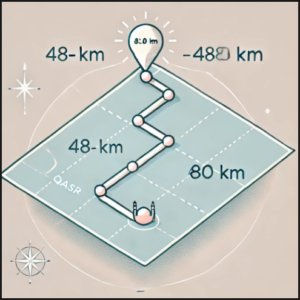
In Islam, prayer holds a central place in the lives of Muslims, serving as a direct means of worship and connection with Allah. However, Islam also provides concessions for those who find themselves in challenging circumstances, such as travel. One of these concessions is Qasr prayer, which allows Muslims to shorten their obligatory prayers during travel. Understanding the conditions for Qasr is crucial for any Muslim who frequently journeys or plans to do so, as this practice reflects Islam’s mercy and flexibility.
This blog explores the essential conditions and intentions required for Qasr, providing a clear and comprehensive guide on when and how Muslims can shorten their prayers, the specific travel distance required, and the necessary intentions for Qasr prayer.
Qasr prayer refers to the Islamic practice of shortening the obligatory prayers during travel. Specifically, Qasr allows the reduction of the four-unit (rakat) prayers—Dhuhr, Asr, and Isha—to two units. This practice is seen as a form of divine leniency, making it easier for Muslims to perform their prayers even while on the road. However, it’s important to note that only these specific prayers are eligible for Qasr; the shorter prayers like Fajr and Maghrib remain unchanged.
Qasr is often coupled with Jama’ (combining prayers), where travelers may combine Dhuhr with Asr and Maghrib with Isha to further ease their obligations during travel. Together, Qasr and Jama guidelines help Muslims maintain their devotion to prayer without being overly burdened by travel. You can find a step-by-step guide on combining prayers while traveling on The Muslim Vibe.
Conditions for Qasr Prayer

To be eligible for Qasr, a Muslim traveler must meet certain conditions. These include specific distance requirements, intention for travel, and duration of stay at their destination. Each condition ensures that the practice of Qasr is applied thoughtfully, in accordance with Islamic principles.
- Travel Distance Requirements
One of the primary requirements for performing Qasr is the travel distance. Most Islamic scholars agree that the minimum distance required to qualify for Qasr ranges between 48 to 80 kilometers (around 30 to 50 miles). This measure was derived from the Sunnah, based on distances the Prophet Muhammad (peace be upon him) considered as travel for the purpose of Qasr.
Understanding the distance requirement for Qasr is crucial, as it helps distinguish between short trips that do not qualify and longer journeys where Qasr becomes permissible. In Islamic jurisprudence, travel distance for shortening prayer is typically measured from the boundaries of one’s city or town to the destination.
- Travel Intention and Purpose
Another important aspect of Qasr prayer conditions is the traveler’s intention for travel. According to Islamic rulings on travel and prayer, Qasr is allowed only when a Muslim sets out on a journey with a clear, valid purpose. A mere outing or short visit does not qualify; the travel must be undertaken with the intent to cover a significant distance. Additionally, the purpose of the travel should not involve sinful activities, as Qasr is a divine concession meant to aid and benefit sincere worshippers.
- Temporary vs. Permanent Travel Status
The status of travel also plays a role in determining eligibility for Qasr. Temporary travel, where one plans to return home after a period of time, is considered valid for Qasr. However, if a Muslim relocates or resides permanently in a new location, they cannot continue to shorten their prayers. This distinction between temporary and permanent travel ensures that Qasr remains an occasional convenience rather than a habitual practice.
- Duration of Stay at Destination
The duration of stay at a destination impacts whether a Muslim can perform Qasr. Scholars vary on the maximum duration that qualifies for Qasr, with some permitting it for up to 15 days, while others may suggest shorter periods. The general rule is that if the traveler intends to stay beyond a specified period (usually three to 15 days), they should resume performing full prayers. This duration guideline serves as an essential aspect of Qasr prayer eligibility.
Different schools of thought offer varying interpretations of Qasr prayer rules. You can explore these details on SeekersGuidance.
- Mode of Travel and Journey Type
The mode of travel also factors into the decision to shorten prayers, although this condition is more flexible. Historically, modes of travel included walking, riding animals, or sailing, but in the modern era, cars, planes, and trains also meet the conditions for Qasr as long as the distance is sufficient. Daily commutes, however, do not qualify since the intention is to return home the same day, highlighting the difference between regular commuting and eligible travel.
Intentions and Making the Niyyah for Qasr
An essential part of performing Qasr prayer is making a sincere intention (or niyyah). In Islam, intentions reflect the purpose and purity of a believer’s actions. Before beginning their journey, Muslims should consciously make the intention for Qasr in their hearts, acknowledging their need to shorten prayers to fulfill obligations during travel.
The intention for prayer shortening can be simple and direct. For example, when embarking on a journey, a Muslim might silently say in their heart, “I intend to perform Qasr during my travel.” Making such an intention helps set a clear purpose and aligns the traveler’s actions with their faith.
For the correct niyyah (intention), you can refer to common supplications available on Dua and Adhkar.
Guidelines for Performing Qasr Prayers
To perform Qasr prayers correctly, travelers should follow the guidelines laid out in Islamic teachings, including when to combine prayers (Jama) and how to shorten the prayers themselves.
- Combining Prayers (Jama) When Traveling
Alongside Qasr, Muslims may also be permitted to combine prayers while traveling. This often means combining Dhuhr with Asr and Maghrib with Isha. The combined prayers can be performed at either of the two prayer times, depending on convenience. Combining and shortening prayers together exemplifies the leniency Islam offers to ease worship during travel.
- Shortening Prayer Details
When performing Qasr prayer, Dhuhr, Asr, and Isha are shortened from four rakats to two. Fajr and Maghrib remain unchanged as they are already short in duration. This prayer length during travel is prescribed to make it manageable for travelers to maintain their religious duties without excessive burden.
- Exceptions and Special Cases
There are specific cases where travelers might need to adjust their Qasr practice. If a journey becomes extended unexpectedly, travelers may continue with Qasr until they decide to stay long-term. However, if they settle or extend their stay with no return plans, they should resume full prayers. This flexibility ensures Qasr prayer conditions are applied fairly based on changing travel circumstances.
Common Misconceptions about Qasr
Several misconceptions surround the practice of Qasr, with some Muslims mistakenly believing that even short commutes qualify. In reality, conditions for Qasr are quite specific. Common misunderstandings include confusing the purpose of travel (e.g., recreational visits vs. necessary travel) and assuming that any journey qualifies. By clarifying these points, Muslims can better understand the Islamic guidelines on journey and prayer and avoid misapplying this concession.
FAQs on Qasr and Travel Prayers
- Can Qasr be performed on a business trip?
- Yes, as long as the distance and other conditions are met, business trips are eligible for Qasr.
- What if my journey extends unexpectedly?
- Travelers can continue with Qasr if they initially intended a temporary stay, as per Islamic rulings on travel and prayer.
- Do I need to perform Qasr if traveling for leisure?
- Yes, travel for leisure qualifies as long as it meets the distance and intention requirements.
For further details on conditions for Qasr, you can refer to this guide on Islam Q&A.
Conclusion
The conditions for Qasr reflect Islam’s compassion and understanding of the challenges travelers face. By offering flexibility in prayer, Islam encourages devotion without excessive hardship. Understanding these conditions and making the correct intentions for Qasr enriches the spiritual journey of any Muslim traveler.
As we reflect on the wisdom behind Qasr, may we gain greater appreciation for Islam’s adaptability and continue to honor our obligations, no matter where we may journey.





